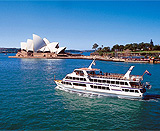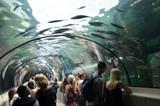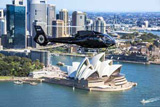
sydney.com.au
Est 1994, Sydney's oldest tourism website

|
|
The Rocks list
A list of historic places-of-interest in and around The Rocks
We've created a PDF document
of this web page,
which will open
in
a
new
tab. You can
you can print it out and take it with you
1. Russell Hotel
(1887)
143a George Street
The Russell Hotel was built in 1887 on the site of what was once a "Moveable Hospital for His Majesty's Distant Possessions" (circa 1790).
2. Nurses Walk
(1979)
Access from Globe Street, off George Street
The walkway was created in 1979 to honour the nurses who worked in the hospitals set up in The Rocks in the late 18th century and early 19th century. The site of the colony's first bakehouse can be found here. Small shops and cafes are scattered along the walk.
3. Fortune of War Hotel
(1828)
137 George Street
Australia's oldest pub, built in 1828 by convict Samuel Terry who went on to amass great wealth in the colony.
4. The Rocks Police Station
(1914-1915)
127 George Street
Rare Art Noveau tiles on the outside of the building mark this historic hotel, which was named after the Mercantile Rowing Club.
5. Susannah Place
58-64 Gloucester Street
6. Suez Canal
(mid 1800s)
A narrow passageway, originally known as Cornwall Lane, at the end of Nurses Walk and near a sandstone quarry. At one point it was an open sewer, hence the nickname "Sewers Canal". It was later filled in but for most of the 18th century was the haunt of prostitues and gangsters.
6a. 28-30 Harrington Street
(mid 1820s)
These cottages are probably the earliest remaining buildings in The Rocks.
7. Michael Gannon's House
(c 1838)
45-47 Argyle Street
A house built around 1838, which featured a workshop at the rear from which Michael Unwin carried out his carpentry, joinery and coffin-making business.
8. Cadmans Cottage
(1816)
110 George StreetOne of the oldest surviving buildings in Australia, it was built as a barracks to accommodate the coxswain and crew of the Governor's boats.

Cadman's Cottage
© Sydney Online Pty Ltd
9. Sailor's Home
(1864, 1926)
106 George Street
The Rocks was originally known as a brothels district and this building was set up to provide board and lodgings for sailors, rather than have them go to the brothels. Interestingly, the building was host to sailors until the 1970s.
10. Coroners Court
(1907)
104 George Street
This is the old Coroners Court, which once incorporated the city morgue. The morgue was below the court on Circular Quay West.
11. Mariners Church
(1856-1859)
100 George Street
The neoclassical Mariners Church, a sandstone building, is historically significant because it was the first construction site in Sydney to allow stone masons to reduce their working day from 12 to 8 hours.
12. ASN Co Building
(1884)
1 Hickson Road
The Australasian Steam Navigation Co Building, with its distinctive Flemish gables and bell tower, has long been regarded as a significant Sydney landmark.
13. Campbells Storehouses
(1839-1890)
27 Circular Quay West
Originally a private wharf with gabled storehouses and sandstone bays built to house tea, sugar, cloth and liquor imported from the Far Fast. Now the Waterfront Restaurant.
14. The Merchant's House
(1848)
43 George Street
The only remaining Georgian townhouse of its kind in The Rocks district that exhibits many aspects of the Greek Revival style.
15. Atherden Street
(1880-1881)
Sydney's shortest street.
16. Bunkers Hill
2 Atherden StreetThis hill was a desirable residential area in the 1820s, where the wealthy built their homes to overlook the harbour. It was named after Ebenezer Bunker, captain of the first whaling expedition from Sydney Cove.
17. Argyle Terraces
(1875-1877)
15-31 Playfair Street
Worker's dwellings. In the 1880s they were known as Tara Terrace.
18. Foundation Park
This park contains the remnants of houses constructed on the cliff face in the 1870s.
Foundation Park
© Sydney Online Pty
19. Samson's Cottage
(1844)
Kendall Lane
The remains of an early cottage built for stevedore William Samson, which was partially demolished in the 1920s.
19a. Earth Exchange
(1902-1909)
77 George Street
Now a geological and mining museum but the first two storeys were in fact built as a power station, in 1902. Strangely, by the time it was built, technological advances had made it redundant. The chimney has never been used.
20. The Coachhouse
(1853-1854)
2-6 Kendall Lane
A three-storey sandstone construction built as a storehouse and stables.
21. Unwins' Stores
(1843-1846)
77-85 George Street
Stores built by merchant Frederick Unwick.

Unwin Courtyard
© Sydney Online Pty Ltd
21a. Orient Hotel
(1843-1844)
89 George Street
Operated as a public house since 1851 and originally known as the Marine Hotel.
22. Greenway Lane
Named after Francis Greenway, a prominent colonial architect.
23. Well Courtyard
Situated at the rear of Reynold's Cottage, this coutyard once contained a well and bakehouse.
24. Argyle Stores
Warehouses built in the 1800s and early 1900s.
25. The Australian Hotel
(1914)
100 Cumberland Street
Hotel with interesting features, including a slit-level bar, etched signage and pressed metal ceilings.
26. The Argyle Cut
One of Sydney's greatest engineering feats, the Argyle Cut involved slicing through the sandstone ridge of The Rocks to connect Darling Harbour and Millers Point with Sydney Cove.
27. Argyle Stairs
These stairs, at the Argyle Cut, take you up to Cumberland Street where there is a second set of stairs that allow you to access the Sydney harbour Bridge pedestrian pathway. You can use the walkway to walk across the bridge, and then go down a further set of stairs to the Millers Point Ferry Stop, where you can catch a ferry back to Circular Quay.
28. Observatory Hill and Sydney Observatory
The Sydney Observatory is located on top of Observatory Hill at the back of The Rocks. The parkland around the observatory offers sweeping views of the back harbour and the Sydney Harbour Bridge. Popular outdoor spot for wedding ceremonies due to the spectacular backdrop of the bridge and harbour.
29. Jobbins Terrace
(1850s)
103-111 Gloucester Street
JobbinsTerrace is of NSW state significance for its ability to demonstrate domestic life in The Rocks from pre-1830 to the present.











